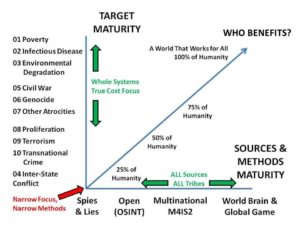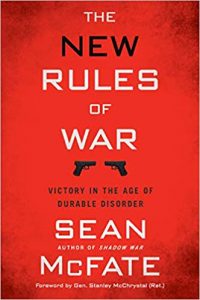
Sean McFate
3 Stars — Company Grade Officer Dabbles as Mercenary, Earns PhD, Pens a Sophmoric Best Seller Catering to Deep State Interests
Reviewed by Robert David Steele
This book is at best a ten page article with ten cute “rules” half of which are wrong. There are some useful observations in the book but it loses a second star and drops to three because it is completely lacking on multiple fronts. There are two kinds of “strategic” authors: opportunists, and visionaries. The author falls into the first category. He has no interest in — and no idea about — making things better (nor does he have a holistic analytic model), he is simply seeking to profit from “durable disorder” and advance his career within the Deep State / Shadow Government system that promotes people like him instead of people like Col Dr. Doug Macgregor.
The ten rules:
Rule 1: Conventional War Is Dead
Rule 2: Technology Will Not Save Us
Rule 3: There Is No Such Thing as War or Peace — Both Coexist, Always
Rule 4: Hearts and Minds Do Not Matter
Rule 5: The Best Weapons Do Not Fire Bullets
Rule 6: Mercenaries Will Return
Rule 7: New Types of World Powers Will Rule
Rule 8: There Will Be Wars Without States
Rule 9: Shadow Wars Will Dominate
Rule 10: Victory Is Fungible
There is no point to my spending time criticizing this book. I knew immediately after looking at the bibliography and index that this was a book by a man-child seeking to impress his mentors (Petraeus and McChristal and whoever runs Atlantic Council these days) and no doubt he has done so — this is their brand of pablum. This is an Op Ed book, not a PhD book, and certainly not a book with anything to offer the President of the United States of America or anyone actually desiring to Make America Great Again.
What finally did it for me was reading the author's pretentious discussion of the deep state, which he gets completely wrong. The “deep state” he discusses is actually the Shadow Government (the combination of political parties and captured institutions that front for the Deep State) and I find it annoying that he seems to be deliberately avoiding any mention of Peter Dale Scott who is (along with David Ray Griffin) the top US authors on the topic of the Deep State. His critical comments, some of which are good, appear to be platitudes and he has managed to not read — or not cite — the works of any of the great critics of US foreign and national security policy or US defense acquisition. There is of course no discussion at all of the degree to which the USA has been subverted by the British Empire, Israel, Freemasons, and others. There is no discussion of the sorrows of empire or how easily we could create a prosperous world at peace if we simply got a grip on our integrity.
I am reminded of Thomas Barbett's book, The Pentagon's New Map: War and Peace in the Twenty-First Century that was better than this book but still half-baked — it took Barnett about three years to distill and refine his emerging ideas into something truly valuable. Perhaps the same will occur with McFate.
The author appears to have zero familiarity with any works outside his narrow Op Ed focus — such as those on non-military threats, non-military solutions, true cost economics, ethics, information peacekeeping, etcetera. His focus is “mercenary lite” — how do we shift funding from the conventional military to the private sector “ronin” that seek to gain budget share within the US military-industrial complex. I find his dismissal of both CIA paramilitary capabilities (when done right) and Special Operations Forces capabilities (when done right) to be cavalier and typical of the arrogance of the untested young who are being nurtured by powerful mentors as their next generation “insider” puppies.
The final reason I give this book three stars instead of four is for its lack of ethical gravitas and what I find to be unwarranted pretense in relation to his claimed exploits as a mercenary. It is in fact possible to create a prosperous world at peace, you simply have to — as General Al Gray wrote in 1989, in the article I ghost-wrote for him but he improved — invest in peaceful preventive measures. This young man is very ignorant across the board, and particularly in relation to the world of intelligence done right (which rarely occurs). I put the book down with annoyance.
This book is a mix of well-intentioned PhD prescriptions and street corner bluster.
Below I provide Al Gray's article as I ghost wrote it and he improved it; my first strategic appraisal for the US Army's Strategic Studies Institute, and my most recent book on reinventing national security.
1989 General Al Gray with Robert Steele on Global Intelligence Challenges
2001 Threats, Strategy, and Force Structure: An Alternative Paradigm for National Security
Robert Steele: Open Letter to the President: Reinventing National Security – New Book
Readers seeking vastly more substance than can be found in McFate's book can consider the books in the lists below that I summarize.
Worth a Look: Book Review Lists (Positive Future-Oriented)
Worth a Look: Book Review Lists (Negative Status-Quo)
Worth a Look: Recent Books on 10 High Level Threats
Worth a Look: Recent Books on 12 Core Policies
As an after thought, here is one graphic on why get get it wrong (how we spend money) followed by a few graphics on how to get it right.
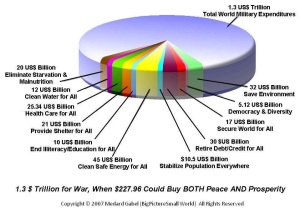
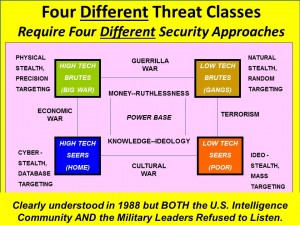
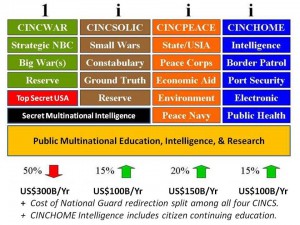
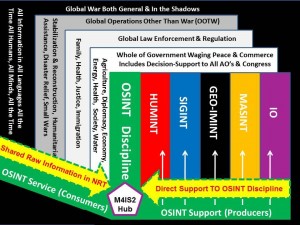
How we spend money matters. How we spend money depends on our ethics — our values. Ethics is an operating system. Right now the US Government and US society are running without ethics — we are a cheating, lying culture.
ADDENDUM: A top retired Army officer comments:
After reading your review, doing some research, this guy is a fraud…..REDACTED does not engage in operations in Africa that would lend to the title mercenary, just logistics and personal defense. This guy is trying to make a name for himself, but fails. He does not understand insurgencies and how a third world power can continually defeat a modern army. The Afghans have been doing it to the Brits and others for almost 200 years, the Vietnamese did it to us, the Afghans did it to the Russians (they would have been successful without our help, we just shortened the timeframe). The Romans found out the same thing, and the Colonials did it to the Brits in our Revolution. Armies that become big and dependent on firepower will often fail to conquer those armies who rely on subterfuge to fight…..I don't think you were harsh enough.



